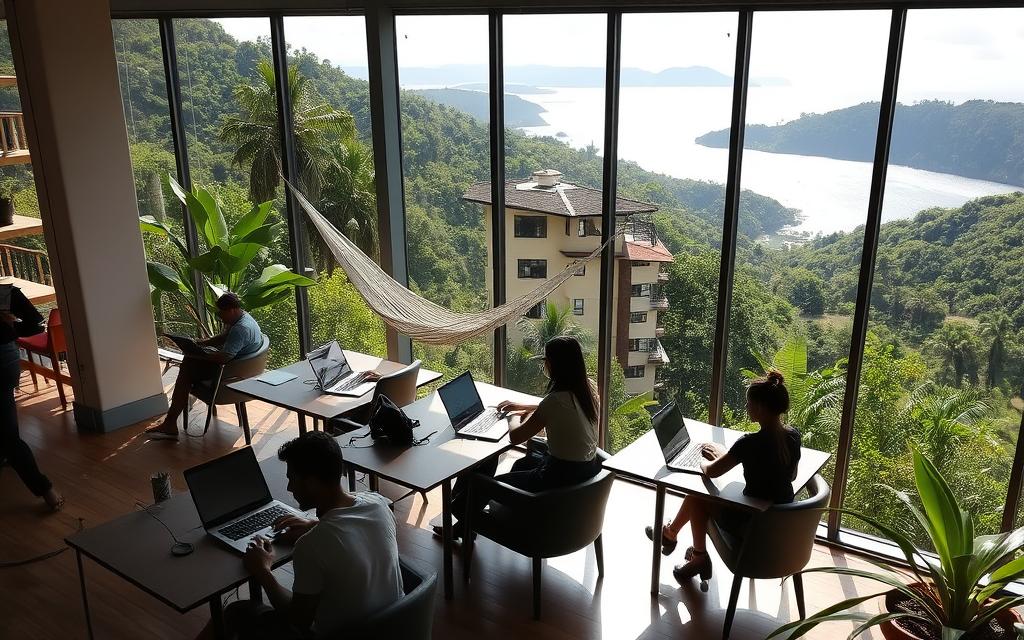Can I Work Remotely for a Foreign Company in Costa Rica?

Over 50,000 expats currently call Costa Rica home, drawn by its tropical landscapes and welcoming culture. This Central American gem has become a hotspot for digital nomads seeking a balanced lifestyle. With its mild climate, stunning beaches, and supportive communities, it’s no wonder many are choosing to make the move.
Living in Costa Rica offers more than just natural beauty. The country’s affordable cost of living and reliable internet make it an ideal destination for remote professionals. However, understanding visa and residency requirements is crucial before making the leap.
From the Digital Nomad Visa to temporary residency options, there are pathways to legally live and work here. For those considering this lifestyle, understanding the tax implications is equally important. Costa Rica’s appeal lies in its ability to blend work opportunities with an enviable quality of life.
Understanding Costa Rica Residency and Lifestyle

Costa Rica offers a variety of residency options tailored to different lifestyles and income sources. Whether you’re a retiree, entrepreneur, or digital professional, there’s a pathway that fits your needs. From rentista to investment and permanent residency, the process is designed to be accessible and straightforward.
Overview of Residency Options
The rentista residency is ideal for individuals with a stable income. It requires proof of $2,500 per month for at least two years or a $60,000 bank deposit. Entrepreneurs often opt for investment residency, which involves a minimum $150,000 investment in real estate or a business.
For those planning to stay long-term, permanent residency is a viable option. It provides access to public healthcare and other benefits. Each program caters to specific needs, making it easier to transition into life in this vibrant country.
Benefits of Living in a Welcoming Environment
Living in Costa Rica means embracing a culture that values natural beauty and community. The cost of living is affordable, and public services like healthcare are impressive. Residents enjoy a balanced lifestyle, surrounded by stunning landscapes and friendly locals.
Whether you’re exploring temporary or permanent residency, the process is designed to be simple. This welcoming environment makes it easier to focus on what truly matters—building a fulfilling life in a new home.
Exploring Remote Work Opportunities and the Digital Nomad Lifestyle

Costa Rica has become a hub for digital nomads seeking a perfect blend of work and leisure. The country’s affordable cost of living, reliable internet, and coworking spaces make it an ideal destination for professionals. Whether in urban centers or coastal towns, remote workers find everything they need to thrive.
Trends Among Remote Workers in Costa Rica
More professionals are choosing Costa Rica for its vibrant culture and supportive infrastructure. The digital nomad visa has made the process straightforward, with a monthly income requirement of $3,000 for individuals. Families can also benefit, as the visa allows dependents to join.
Affordable housing and fast internet are key factors attracting remote workers. Many find that the cost of living is lower compared to their home countries. This makes it easier to balance work and leisure while enjoying the country’s natural beauty.
Balancing Work and Tropical Living
Living in Costa Rica offers a unique opportunity to blend productivity with relaxation. Professionals can work from beachside cafes or mountain retreats, all while staying connected. The country’s welcoming environment makes it easy to adapt to a new lifestyle.
For families, Costa Rica provides a safe and enriching experience. Schools, healthcare, and recreational activities are accessible, ensuring a smooth transition. This balance of work and family life is a major draw for many remote workers.
Understanding visa requirements is essential for a seamless experience. The digital nomad visa allows professionals to stay for up to a year, with the option to renew. This flexibility supports long-term planning and a stress-free process.
Can I work remotely for a foreign company with Costa Rica residency?

Costa Rica’s welcoming policies make it a top choice for professionals seeking remote work opportunities. The country’s residency programs support remote workers in building a fulfilling lifestyle. Understanding the legal framework is essential for a smooth transition.
Remote professionals must provide proof of employment and income to qualify. This includes documentation such as contracts, pay stubs, and bank statements. A valid passport is also required to verify identity and nationality.
One of the key benefits of this setup is the ability to legally stay while working for foreign employers. Costa Rica’s digital nomad visa ensures compliance with local laws. This visa allows professionals to focus on their careers without worrying about legal issues.
It’s important to note that remote work arrangements must avoid conflicts with the local job market. Costa Rican law prioritizes employment opportunities for its citizens. By adhering to these guidelines, remote workers can enjoy a seamless experience.
For those considering this path, understanding the value of residency is crucial. The process is designed to be straightforward, ensuring professionals can focus on their goals. Costa Rica’s supportive environment makes it an ideal destination for remote work.
Navigating Visa Options and Work Permit Processes

Navigating visa options in Costa Rica requires understanding the specific requirements for each category. Whether you’re a digital nomad, investor, or retiree, the process is designed to be accessible. Each pathway has unique income and document requirements, ensuring a tailored approach to residency.
Digital Nomad and Rentista Visa Requirements
The digital nomad visa is ideal for professionals working remotely. Applicants must prove a monthly income of $3,000 for individuals or $4,000 for families. This visa allows a stay of up to one year, with the option to renew.
For those with a stable income, the rentista visa is another option. It requires proof of $2,500 per month for two years or a $60,000 bank deposit. Both visas simplify the process of living and working in Costa Rica.
Investment and Permanent Residency Pathways
Investors can pursue residency by committing $150,000 to real estate or a business. This pathway offers flexibility and long-term benefits. After three years of temporary residency, applicants can apply for permanent residency.
Permanent residency provides access to public healthcare and other benefits. It’s a popular choice for those planning to stay long-term. Understanding the timeline and requirements ensures a smooth transition to life in Costa Rica.
Legal Considerations for Remote Work in Costa Rica

Understanding the legal framework is essential for professionals planning to work remotely in Costa Rica. Compliance with immigration laws ensures a smooth transition and avoids potential complications. Preparing the right documentation is a critical step in this process.
Understanding Immigration Requirements
Remote workers must adhere to specific immigration rules to legally stay in Costa Rica. The application process requires proof of income, such as pay stubs or bank statements. This ensures that applicants meet the financial criteria for residency.
Accurate documentation is crucial for a successful application. This includes contracts, proof of employment, and valid identification. Providing clear and complete information helps avoid delays or rejections.
For those running a business, additional documents may be required. These could include business licenses or proof of investment. Ensuring all paperwork is in order simplifies the process and supports compliance with local laws.
Working with legal professionals in Costa Rica can provide valuable guidance. They help navigate the complexities of immigration requirements and ensure all steps are followed correctly.
By adhering to these legal considerations, remote workers can focus on their careers while enjoying the benefits of living in Costa Rica. Proper preparation and compliance are key to a successful transition.
Choosing the Ideal Location for Remote Work
Choosing the right location in Costa Rica can significantly impact your remote work experience. Whether you prefer the energy of urban centers or the tranquility of coastal towns, each setting offers unique advantages. Understanding the differences helps you make an informed decision that aligns with your lifestyle and work needs.
Urban vs. Coastal Living: Pros and Cons
Urban areas like San José provide access to modern amenities, coworking spaces, and reliable internet. These locations are ideal for professionals who value convenience and networking opportunities. However, the cost of living can be higher compared to coastal towns.
Coastal gems like Tamarindo and Santa Teresa offer a laid-back lifestyle with stunning ocean views. These areas are perfect for those seeking a balance between work and relaxation. While internet connectivity is improving, it may not yet match urban standards.
Cost of Living and Local Amenities
The cost of living varies depending on your chosen location. Urban centers tend to have higher housing and dining costs, while coastal towns are more affordable. Monthly income requirements for visas also influence your budget, so planning is essential.
Local amenities play a crucial role in your daily life. Urban areas offer more healthcare facilities, shopping centers, and entertainment options. Coastal towns provide access to outdoor activities like surfing and hiking, enhancing your work-life balance.
Tax considerations are another factor to keep in mind. While the digital nomad visa offers income tax exemptions, other residency options may have different rules. Understanding these details ensures compliance and financial stability.
For those exploring residency options, investor residency vs. permanent residency provides valuable insights into long-term planning. Selecting the right location and residency pathway supports a seamless transition to life in Costa Rica.
Expert Immigration Support and Guidance
Legal professionals play a crucial role in ensuring a smooth immigration experience in Costa Rica. Navigating the country’s immigration system can be complex, but expert guidance simplifies the process. From visa applications to residency requirements, experienced advisors provide invaluable support.
Benefits of Working with Legal Professionals
Consulting immigration experts ensures that all documents are prepared accurately. They help meet timelines and avoid common errors, making the process faster and more efficient. Professionals also provide clarity on specific requirements, reducing stress for applicants.
Successful cases often involve detailed planning and adherence to legal guidelines. Experts assist in gathering necessary paperwork, such as proof of income and employment contracts. This ensures that applications meet all criteria for approval.
Working with legal advisors speeds up the day-to-day process. They handle complex tasks, allowing applicants to focus on their transition. This support is especially valuable for those unfamiliar with Costa Rica’s immigration laws.
For those seeking expert assistance, Costa Rica legal services offer tailored solutions. Their expertise ensures a seamless experience, from initial consultation to final approval.
Step-by-Step Guide to the Application Process
Starting the residency application process in Costa Rica is straightforward with the right guidance. We’ll walk you through each step, from document preparation to final approval, ensuring you feel confident every step of the way. Whether you’re entering as a tourist or planning long-term residency, this guide simplifies the process.
Document Preparation and Submission
The first step is gathering all required documents. These typically include proof of income, a valid passport, and employment contracts. For those applying as a tourist, a clean criminal record and medical insurance are also necessary.
Accurate documentation is crucial to avoid delays. We recommend double-checking all forms and ensuring they’re complete before submission. Missing or incorrect information can extend the processing time significantly.
Timeline and Key Application Steps
The application timeline varies depending on the visa type. For the Digital Nomad Visa, processing takes about 15 calendar days. Temporary residency applications may take between 3 to 8 months, while permanent residency can take up to two years.
After submitting your application, you’ll receive a notification if additional information is needed. Responding promptly ensures the process stays on track. Once approved, you’ll have three months to complete your immigration accreditation.
Understanding the timeline helps you plan your move effectively. Whether you’re seeking a short-term option or long-term residency, knowing what to expect makes the journey smoother.
Special Considerations for Expats, Families, and Long-Term Residents
Expats relocating to Costa Rica often face unique financial and cultural adjustments. For families and long-term residents, understanding these challenges is key to a smooth transition. From meeting income requirements to adapting to local customs, preparation ensures a successful move.
Meeting Income and Proof of Financial Stability
Financial stability is a critical requirement for residency in Costa Rica. Applicants must demonstrate a steady income, such as $3,000 per month for individuals or $4,000 for families. This ensures they can support themselves without relying on local resources.
Proof of income includes bank statements, employment contracts, or pension documents. For families, additional considerations like school fees and healthcare costs should be factored into the budget. Meeting these requirements simplifies the application process and sets the foundation for a stable life.
Adapting to Cultural and Regulatory Challenges
Cultural adaptation is equally important for expats and their families. Costa Rica’s warm and welcoming culture is a highlight, but understanding local customs and traditions is essential. Learning basic Spanish phrases and participating in community events can ease the transition.
Regulatory challenges, such as navigating healthcare and education systems, require careful planning. Families should research schools and healthcare providers in advance. Long-term residents benefit from understanding tax obligations and local laws to avoid complications.
By addressing these challenges, expats can fully embrace the benefits of living in Costa Rica. A supportive environment and a balanced lifestyle await those who prepare thoroughly.
Conclusion
Securing residency in Costa Rica opens doors to a vibrant lifestyle and professional opportunities. By following each step carefully, expats can ensure a smooth transition into this welcoming environment. From understanding visa costa requirements to meeting legal obligations, preparation is key.
Working under Costa Rican residency offers significant benefits, including access to a supportive community and a balanced lifestyle. Consulting experts and preparing necessary documents simplifies the process, making it easier to focus on your job and personal goals.
For those considering long-term residence, Costa Rica provides a rewarding experience. Take the next step in your journey and explore the possibilities of living in this tropical paradise.


